Entrepreneurship in Travel and Tourism: Business Plan and Finance
VerifiedAdded on 2020/11/23
|10
|3994
|165
Report
AI Summary
This report delves into the realm of travel and tourism entrepreneurship, examining the essential skills required for success, including ambition, willingness to learn, creativity, and risk-taking. It presents a SWOT analysis of entrepreneurial skills, evaluating strengths, weaknesses, opportunities, and threats. The report further explores the development of entrepreneurial enterprises, highlighting strategies and factors contributing to success, such as talent acquisition, networking, hard work, sales performance, and innovative ideas. It also discusses financial support sources for tourism ventures, including personal savings and other funding options. The report concludes with a business plan, encompassing market assessment, business and cash-flow analysis, and a persuasive start-up plan, justifying the potential for success in the travel and tourism sector. The report also covers case studies of successful entrepreneurs in the travel and tourism sector, such as Sir Richard Branson, and provides insights into their strategies and leadership styles.
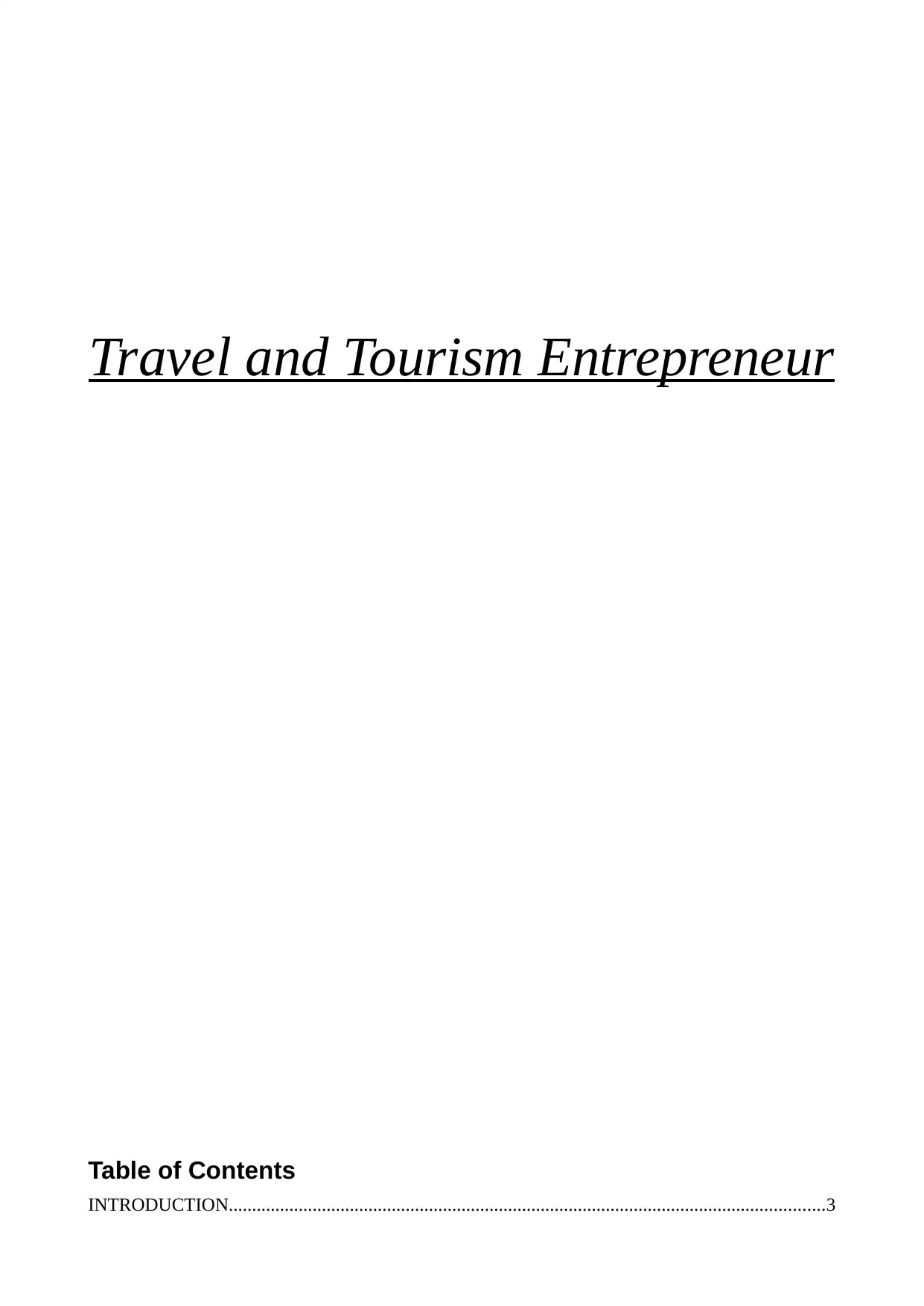
Travel and Tourism Entrepreneur
Table of Contents
INTRODUCTION................................................................................................................................3
Table of Contents
INTRODUCTION................................................................................................................................3
Paraphrase This Document
Need a fresh take? Get an instant paraphrase of this document with our AI Paraphraser
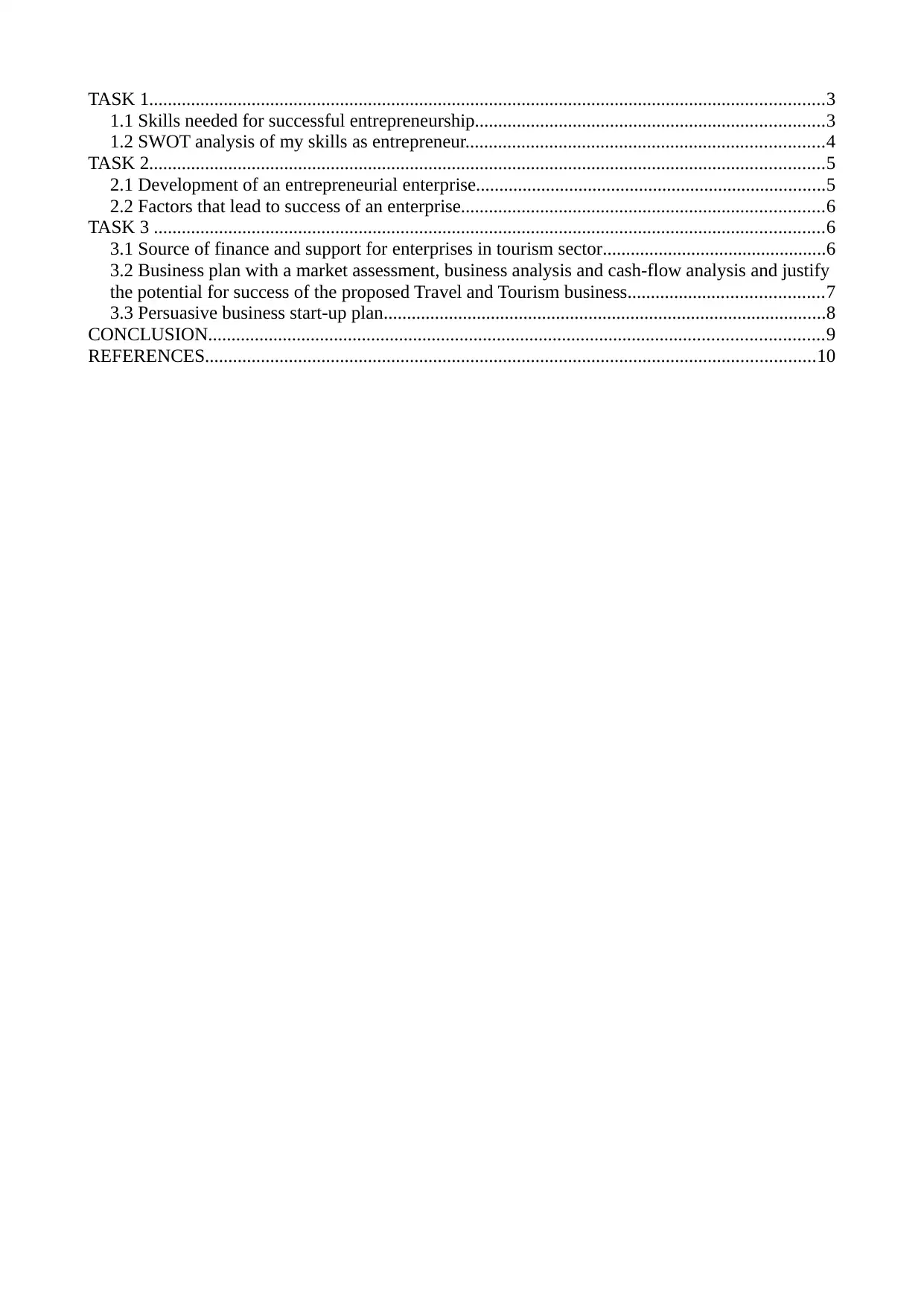
TASK 1.................................................................................................................................................3
1.1 Skills needed for successful entrepreneurship...........................................................................3
1.2 SWOT analysis of my skills as entrepreneur.............................................................................4
TASK 2.................................................................................................................................................5
2.1 Development of an entrepreneurial enterprise...........................................................................5
2.2 Factors that lead to success of an enterprise..............................................................................6
TASK 3 ................................................................................................................................................6
3.1 Source of finance and support for enterprises in tourism sector................................................6
3.2 Business plan with a market assessment, business analysis and cash-flow analysis and justify
the potential for success of the proposed Travel and Tourism business..........................................7
3.3 Persuasive business start-up plan...............................................................................................8
CONCLUSION....................................................................................................................................9
REFERENCES...................................................................................................................................10
1.1 Skills needed for successful entrepreneurship...........................................................................3
1.2 SWOT analysis of my skills as entrepreneur.............................................................................4
TASK 2.................................................................................................................................................5
2.1 Development of an entrepreneurial enterprise...........................................................................5
2.2 Factors that lead to success of an enterprise..............................................................................6
TASK 3 ................................................................................................................................................6
3.1 Source of finance and support for enterprises in tourism sector................................................6
3.2 Business plan with a market assessment, business analysis and cash-flow analysis and justify
the potential for success of the proposed Travel and Tourism business..........................................7
3.3 Persuasive business start-up plan...............................................................................................8
CONCLUSION....................................................................................................................................9
REFERENCES...................................................................................................................................10
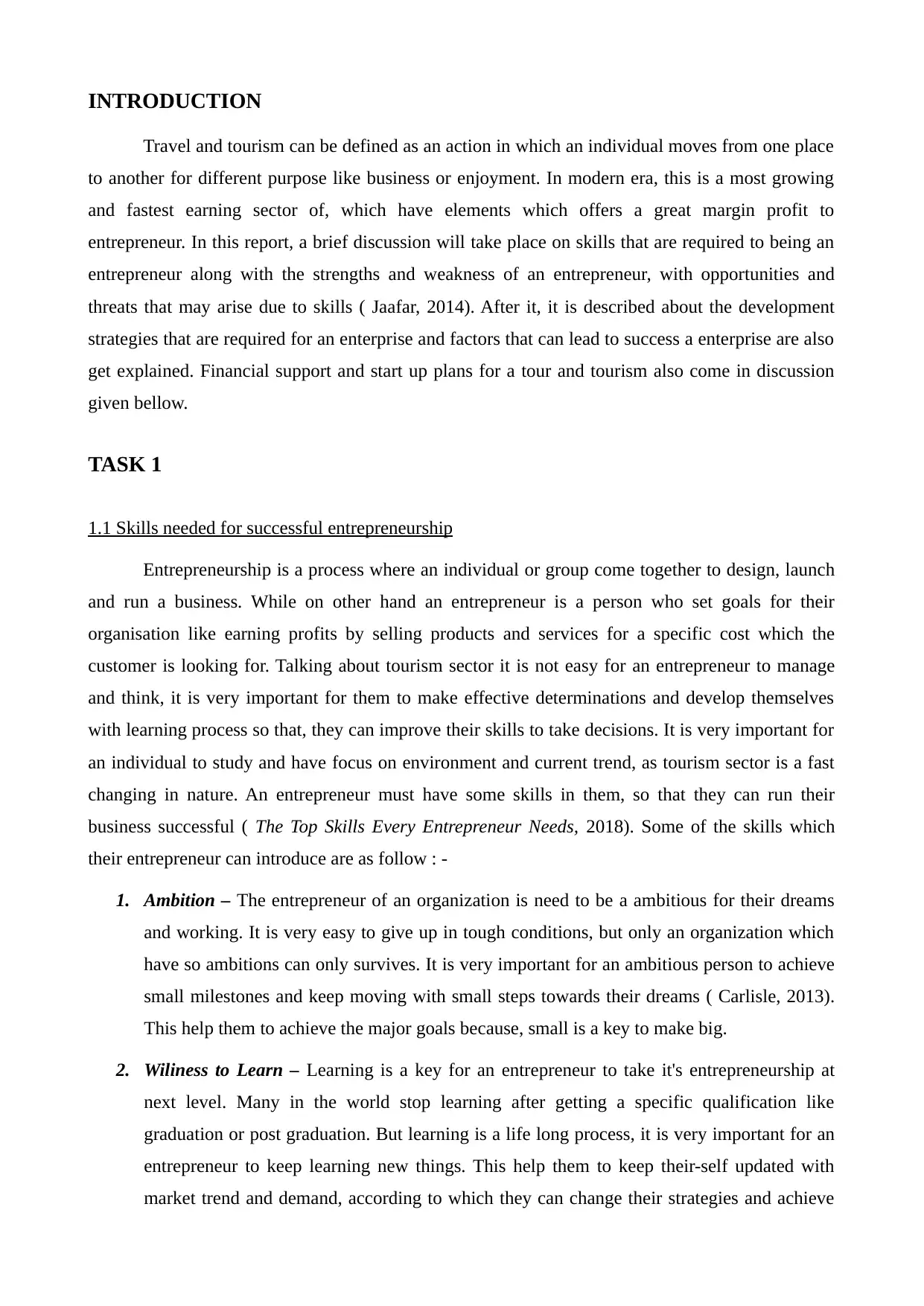
INTRODUCTION
Travel and tourism can be defined as an action in which an individual moves from one place
to another for different purpose like business or enjoyment. In modern era, this is a most growing
and fastest earning sector of, which have elements which offers a great margin profit to
entrepreneur. In this report, a brief discussion will take place on skills that are required to being an
entrepreneur along with the strengths and weakness of an entrepreneur, with opportunities and
threats that may arise due to skills ( Jaafar, 2014). After it, it is described about the development
strategies that are required for an enterprise and factors that can lead to success a enterprise are also
get explained. Financial support and start up plans for a tour and tourism also come in discussion
given bellow.
TASK 1
1.1 Skills needed for successful entrepreneurship
Entrepreneurship is a process where an individual or group come together to design, launch
and run a business. While on other hand an entrepreneur is a person who set goals for their
organisation like earning profits by selling products and services for a specific cost which the
customer is looking for. Talking about tourism sector it is not easy for an entrepreneur to manage
and think, it is very important for them to make effective determinations and develop themselves
with learning process so that, they can improve their skills to take decisions. It is very important for
an individual to study and have focus on environment and current trend, as tourism sector is a fast
changing in nature. An entrepreneur must have some skills in them, so that they can run their
business successful ( The Top Skills Every Entrepreneur Needs, 2018). Some of the skills which
their entrepreneur can introduce are as follow : -
1. Ambition – The entrepreneur of an organization is need to be a ambitious for their dreams
and working. It is very easy to give up in tough conditions, but only an organization which
have so ambitions can only survives. It is very important for an ambitious person to achieve
small milestones and keep moving with small steps towards their dreams ( Carlisle, 2013).
This help them to achieve the major goals because, small is a key to make big.
2. Wiliness to Learn – Learning is a key for an entrepreneur to take it's entrepreneurship at
next level. Many in the world stop learning after getting a specific qualification like
graduation or post graduation. But learning is a life long process, it is very important for an
entrepreneur to keep learning new things. This help them to keep their-self updated with
market trend and demand, according to which they can change their strategies and achieve
Travel and tourism can be defined as an action in which an individual moves from one place
to another for different purpose like business or enjoyment. In modern era, this is a most growing
and fastest earning sector of, which have elements which offers a great margin profit to
entrepreneur. In this report, a brief discussion will take place on skills that are required to being an
entrepreneur along with the strengths and weakness of an entrepreneur, with opportunities and
threats that may arise due to skills ( Jaafar, 2014). After it, it is described about the development
strategies that are required for an enterprise and factors that can lead to success a enterprise are also
get explained. Financial support and start up plans for a tour and tourism also come in discussion
given bellow.
TASK 1
1.1 Skills needed for successful entrepreneurship
Entrepreneurship is a process where an individual or group come together to design, launch
and run a business. While on other hand an entrepreneur is a person who set goals for their
organisation like earning profits by selling products and services for a specific cost which the
customer is looking for. Talking about tourism sector it is not easy for an entrepreneur to manage
and think, it is very important for them to make effective determinations and develop themselves
with learning process so that, they can improve their skills to take decisions. It is very important for
an individual to study and have focus on environment and current trend, as tourism sector is a fast
changing in nature. An entrepreneur must have some skills in them, so that they can run their
business successful ( The Top Skills Every Entrepreneur Needs, 2018). Some of the skills which
their entrepreneur can introduce are as follow : -
1. Ambition – The entrepreneur of an organization is need to be a ambitious for their dreams
and working. It is very easy to give up in tough conditions, but only an organization which
have so ambitions can only survives. It is very important for an ambitious person to achieve
small milestones and keep moving with small steps towards their dreams ( Carlisle, 2013).
This help them to achieve the major goals because, small is a key to make big.
2. Wiliness to Learn – Learning is a key for an entrepreneur to take it's entrepreneurship at
next level. Many in the world stop learning after getting a specific qualification like
graduation or post graduation. But learning is a life long process, it is very important for an
entrepreneur to keep learning new things. This help them to keep their-self updated with
market trend and demand, according to which they can change their strategies and achieve
⊘ This is a preview!⊘
Do you want full access?
Subscribe today to unlock all pages.

Trusted by 1+ million students worldwide
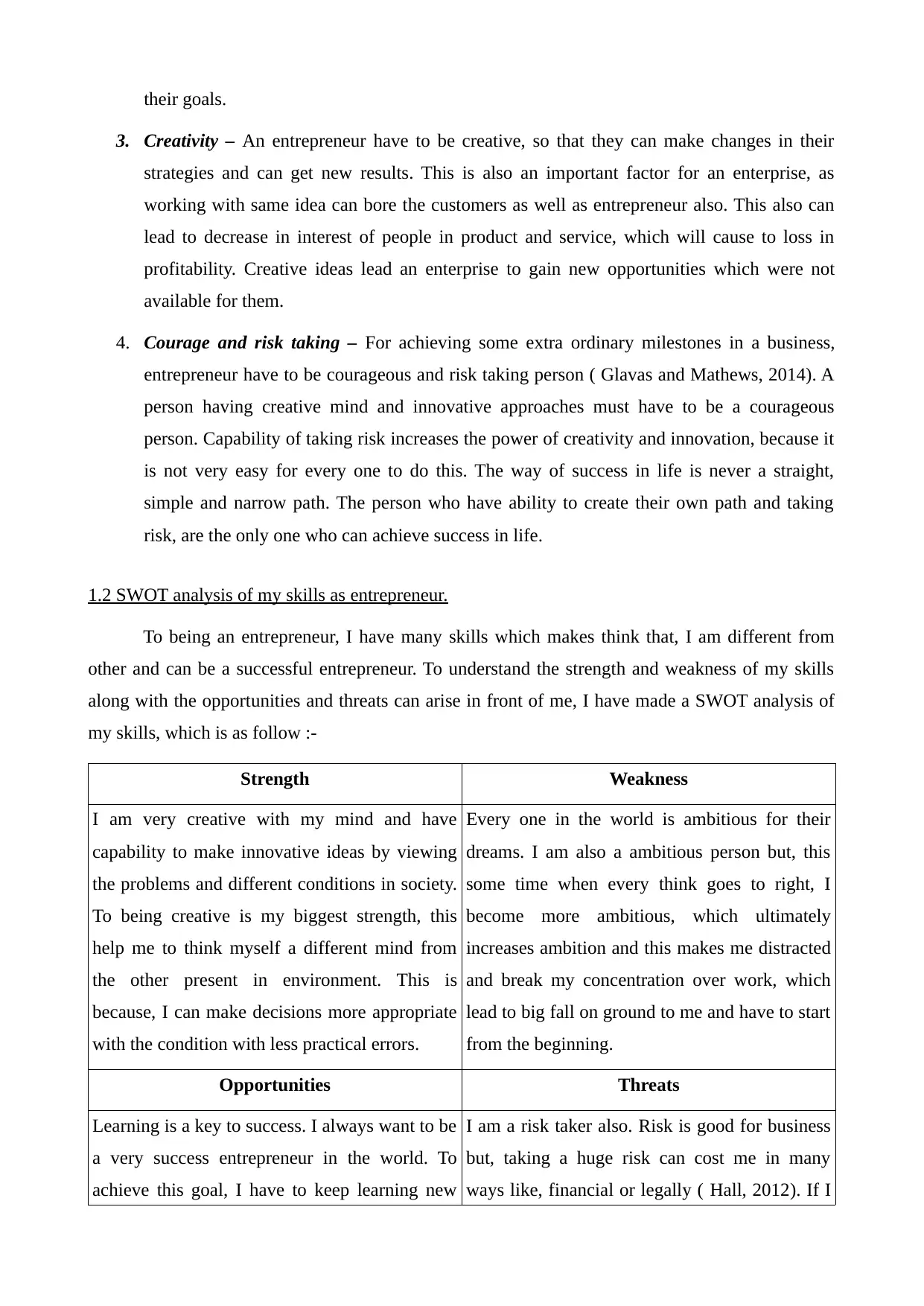
their goals.
3. Creativity – An entrepreneur have to be creative, so that they can make changes in their
strategies and can get new results. This is also an important factor for an enterprise, as
working with same idea can bore the customers as well as entrepreneur also. This also can
lead to decrease in interest of people in product and service, which will cause to loss in
profitability. Creative ideas lead an enterprise to gain new opportunities which were not
available for them.
4. Courage and risk taking – For achieving some extra ordinary milestones in a business,
entrepreneur have to be courageous and risk taking person ( Glavas and Mathews, 2014). A
person having creative mind and innovative approaches must have to be a courageous
person. Capability of taking risk increases the power of creativity and innovation, because it
is not very easy for every one to do this. The way of success in life is never a straight,
simple and narrow path. The person who have ability to create their own path and taking
risk, are the only one who can achieve success in life.
1.2 SWOT analysis of my skills as entrepreneur.
To being an entrepreneur, I have many skills which makes think that, I am different from
other and can be a successful entrepreneur. To understand the strength and weakness of my skills
along with the opportunities and threats can arise in front of me, I have made a SWOT analysis of
my skills, which is as follow :-
Strength Weakness
I am very creative with my mind and have
capability to make innovative ideas by viewing
the problems and different conditions in society.
To being creative is my biggest strength, this
help me to think myself a different mind from
the other present in environment. This is
because, I can make decisions more appropriate
with the condition with less practical errors.
Every one in the world is ambitious for their
dreams. I am also a ambitious person but, this
some time when every think goes to right, I
become more ambitious, which ultimately
increases ambition and this makes me distracted
and break my concentration over work, which
lead to big fall on ground to me and have to start
from the beginning.
Opportunities Threats
Learning is a key to success. I always want to be
a very success entrepreneur in the world. To
achieve this goal, I have to keep learning new
I am a risk taker also. Risk is good for business
but, taking a huge risk can cost me in many
ways like, financial or legally ( Hall, 2012). If I
3. Creativity – An entrepreneur have to be creative, so that they can make changes in their
strategies and can get new results. This is also an important factor for an enterprise, as
working with same idea can bore the customers as well as entrepreneur also. This also can
lead to decrease in interest of people in product and service, which will cause to loss in
profitability. Creative ideas lead an enterprise to gain new opportunities which were not
available for them.
4. Courage and risk taking – For achieving some extra ordinary milestones in a business,
entrepreneur have to be courageous and risk taking person ( Glavas and Mathews, 2014). A
person having creative mind and innovative approaches must have to be a courageous
person. Capability of taking risk increases the power of creativity and innovation, because it
is not very easy for every one to do this. The way of success in life is never a straight,
simple and narrow path. The person who have ability to create their own path and taking
risk, are the only one who can achieve success in life.
1.2 SWOT analysis of my skills as entrepreneur.
To being an entrepreneur, I have many skills which makes think that, I am different from
other and can be a successful entrepreneur. To understand the strength and weakness of my skills
along with the opportunities and threats can arise in front of me, I have made a SWOT analysis of
my skills, which is as follow :-
Strength Weakness
I am very creative with my mind and have
capability to make innovative ideas by viewing
the problems and different conditions in society.
To being creative is my biggest strength, this
help me to think myself a different mind from
the other present in environment. This is
because, I can make decisions more appropriate
with the condition with less practical errors.
Every one in the world is ambitious for their
dreams. I am also a ambitious person but, this
some time when every think goes to right, I
become more ambitious, which ultimately
increases ambition and this makes me distracted
and break my concentration over work, which
lead to big fall on ground to me and have to start
from the beginning.
Opportunities Threats
Learning is a key to success. I always want to be
a very success entrepreneur in the world. To
achieve this goal, I have to keep learning new
I am a risk taker also. Risk is good for business
but, taking a huge risk can cost me in many
ways like, financial or legally ( Hall, 2012). If I
Paraphrase This Document
Need a fresh take? Get an instant paraphrase of this document with our AI Paraphraser
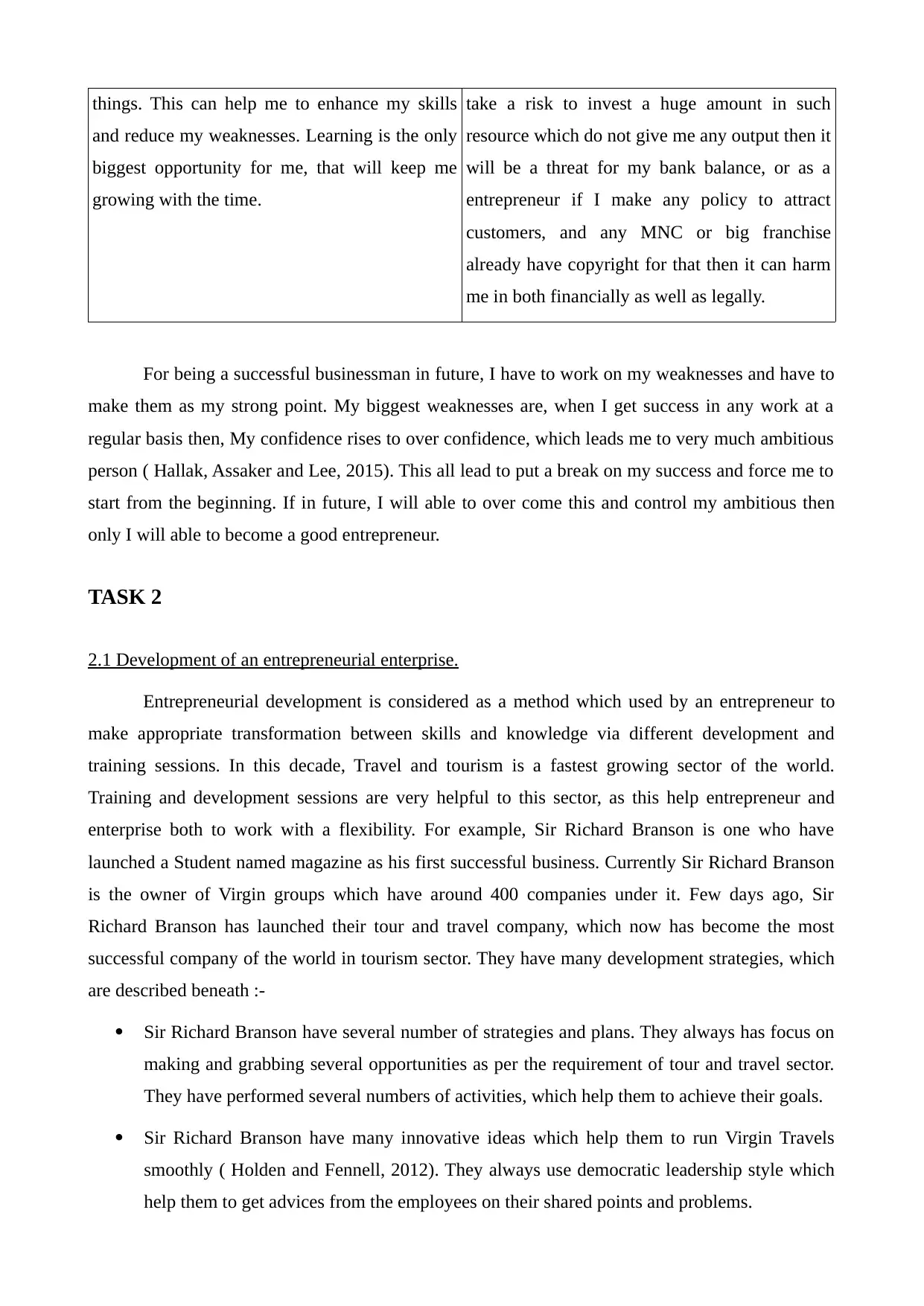
things. This can help me to enhance my skills
and reduce my weaknesses. Learning is the only
biggest opportunity for me, that will keep me
growing with the time.
take a risk to invest a huge amount in such
resource which do not give me any output then it
will be a threat for my bank balance, or as a
entrepreneur if I make any policy to attract
customers, and any MNC or big franchise
already have copyright for that then it can harm
me in both financially as well as legally.
For being a successful businessman in future, I have to work on my weaknesses and have to
make them as my strong point. My biggest weaknesses are, when I get success in any work at a
regular basis then, My confidence rises to over confidence, which leads me to very much ambitious
person ( Hallak, Assaker and Lee, 2015). This all lead to put a break on my success and force me to
start from the beginning. If in future, I will able to over come this and control my ambitious then
only I will able to become a good entrepreneur.
TASK 2
2.1 Development of an entrepreneurial enterprise.
Entrepreneurial development is considered as a method which used by an entrepreneur to
make appropriate transformation between skills and knowledge via different development and
training sessions. In this decade, Travel and tourism is a fastest growing sector of the world.
Training and development sessions are very helpful to this sector, as this help entrepreneur and
enterprise both to work with a flexibility. For example, Sir Richard Branson is one who have
launched a Student named magazine as his first successful business. Currently Sir Richard Branson
is the owner of Virgin groups which have around 400 companies under it. Few days ago, Sir
Richard Branson has launched their tour and travel company, which now has become the most
successful company of the world in tourism sector. They have many development strategies, which
are described beneath :-
Sir Richard Branson have several number of strategies and plans. They always has focus on
making and grabbing several opportunities as per the requirement of tour and travel sector.
They have performed several numbers of activities, which help them to achieve their goals.
Sir Richard Branson have many innovative ideas which help them to run Virgin Travels
smoothly ( Holden and Fennell, 2012). They always use democratic leadership style which
help them to get advices from the employees on their shared points and problems.
and reduce my weaknesses. Learning is the only
biggest opportunity for me, that will keep me
growing with the time.
take a risk to invest a huge amount in such
resource which do not give me any output then it
will be a threat for my bank balance, or as a
entrepreneur if I make any policy to attract
customers, and any MNC or big franchise
already have copyright for that then it can harm
me in both financially as well as legally.
For being a successful businessman in future, I have to work on my weaknesses and have to
make them as my strong point. My biggest weaknesses are, when I get success in any work at a
regular basis then, My confidence rises to over confidence, which leads me to very much ambitious
person ( Hallak, Assaker and Lee, 2015). This all lead to put a break on my success and force me to
start from the beginning. If in future, I will able to over come this and control my ambitious then
only I will able to become a good entrepreneur.
TASK 2
2.1 Development of an entrepreneurial enterprise.
Entrepreneurial development is considered as a method which used by an entrepreneur to
make appropriate transformation between skills and knowledge via different development and
training sessions. In this decade, Travel and tourism is a fastest growing sector of the world.
Training and development sessions are very helpful to this sector, as this help entrepreneur and
enterprise both to work with a flexibility. For example, Sir Richard Branson is one who have
launched a Student named magazine as his first successful business. Currently Sir Richard Branson
is the owner of Virgin groups which have around 400 companies under it. Few days ago, Sir
Richard Branson has launched their tour and travel company, which now has become the most
successful company of the world in tourism sector. They have many development strategies, which
are described beneath :-
Sir Richard Branson have several number of strategies and plans. They always has focus on
making and grabbing several opportunities as per the requirement of tour and travel sector.
They have performed several numbers of activities, which help them to achieve their goals.
Sir Richard Branson have many innovative ideas which help them to run Virgin Travels
smoothly ( Holden and Fennell, 2012). They always use democratic leadership style which
help them to get advices from the employees on their shared points and problems.
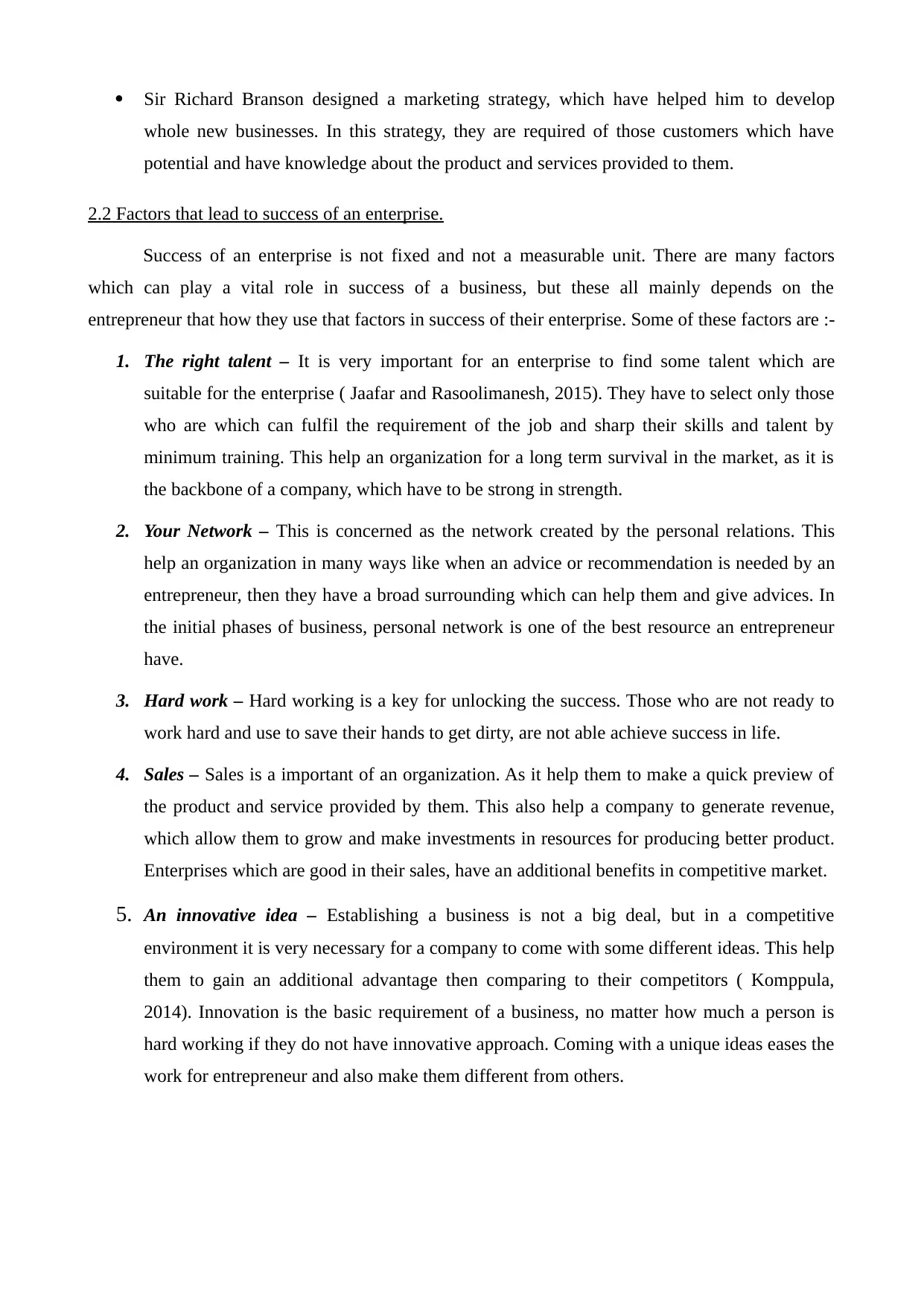
Sir Richard Branson designed a marketing strategy, which have helped him to develop
whole new businesses. In this strategy, they are required of those customers which have
potential and have knowledge about the product and services provided to them.
2.2 Factors that lead to success of an enterprise.
Success of an enterprise is not fixed and not a measurable unit. There are many factors
which can play a vital role in success of a business, but these all mainly depends on the
entrepreneur that how they use that factors in success of their enterprise. Some of these factors are :-
1. The right talent – It is very important for an enterprise to find some talent which are
suitable for the enterprise ( Jaafar and Rasoolimanesh, 2015). They have to select only those
who are which can fulfil the requirement of the job and sharp their skills and talent by
minimum training. This help an organization for a long term survival in the market, as it is
the backbone of a company, which have to be strong in strength.
2. Your Network – This is concerned as the network created by the personal relations. This
help an organization in many ways like when an advice or recommendation is needed by an
entrepreneur, then they have a broad surrounding which can help them and give advices. In
the initial phases of business, personal network is one of the best resource an entrepreneur
have.
3. Hard work – Hard working is a key for unlocking the success. Those who are not ready to
work hard and use to save their hands to get dirty, are not able achieve success in life.
4. Sales – Sales is a important of an organization. As it help them to make a quick preview of
the product and service provided by them. This also help a company to generate revenue,
which allow them to grow and make investments in resources for producing better product.
Enterprises which are good in their sales, have an additional benefits in competitive market.
5. An innovative idea – Establishing a business is not a big deal, but in a competitive
environment it is very necessary for a company to come with some different ideas. This help
them to gain an additional advantage then comparing to their competitors ( Komppula,
2014). Innovation is the basic requirement of a business, no matter how much a person is
hard working if they do not have innovative approach. Coming with a unique ideas eases the
work for entrepreneur and also make them different from others.
whole new businesses. In this strategy, they are required of those customers which have
potential and have knowledge about the product and services provided to them.
2.2 Factors that lead to success of an enterprise.
Success of an enterprise is not fixed and not a measurable unit. There are many factors
which can play a vital role in success of a business, but these all mainly depends on the
entrepreneur that how they use that factors in success of their enterprise. Some of these factors are :-
1. The right talent – It is very important for an enterprise to find some talent which are
suitable for the enterprise ( Jaafar and Rasoolimanesh, 2015). They have to select only those
who are which can fulfil the requirement of the job and sharp their skills and talent by
minimum training. This help an organization for a long term survival in the market, as it is
the backbone of a company, which have to be strong in strength.
2. Your Network – This is concerned as the network created by the personal relations. This
help an organization in many ways like when an advice or recommendation is needed by an
entrepreneur, then they have a broad surrounding which can help them and give advices. In
the initial phases of business, personal network is one of the best resource an entrepreneur
have.
3. Hard work – Hard working is a key for unlocking the success. Those who are not ready to
work hard and use to save their hands to get dirty, are not able achieve success in life.
4. Sales – Sales is a important of an organization. As it help them to make a quick preview of
the product and service provided by them. This also help a company to generate revenue,
which allow them to grow and make investments in resources for producing better product.
Enterprises which are good in their sales, have an additional benefits in competitive market.
5. An innovative idea – Establishing a business is not a big deal, but in a competitive
environment it is very necessary for a company to come with some different ideas. This help
them to gain an additional advantage then comparing to their competitors ( Komppula,
2014). Innovation is the basic requirement of a business, no matter how much a person is
hard working if they do not have innovative approach. Coming with a unique ideas eases the
work for entrepreneur and also make them different from others.
⊘ This is a preview!⊘
Do you want full access?
Subscribe today to unlock all pages.

Trusted by 1+ million students worldwide
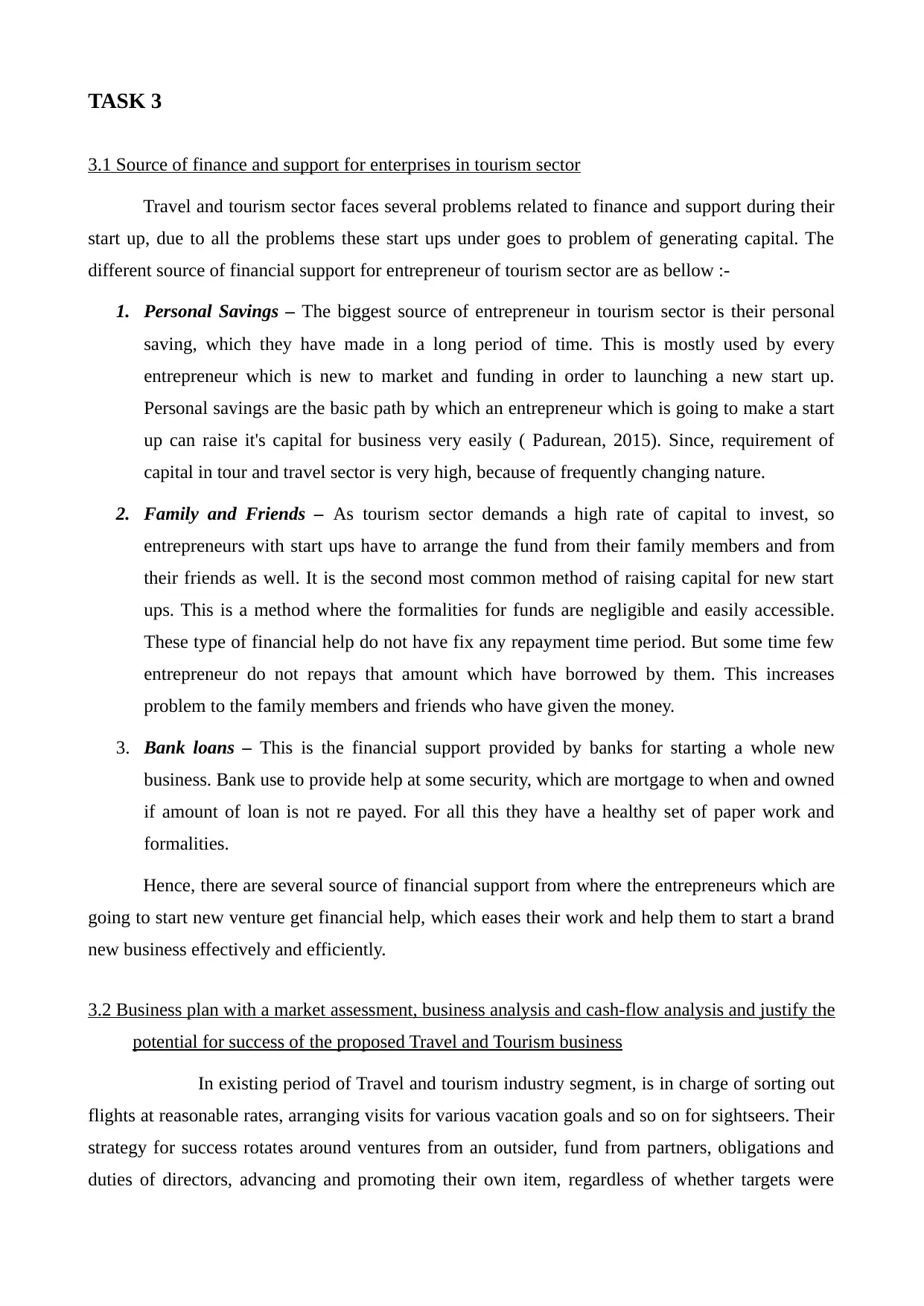
TASK 3
3.1 Source of finance and support for enterprises in tourism sector
Travel and tourism sector faces several problems related to finance and support during their
start up, due to all the problems these start ups under goes to problem of generating capital. The
different source of financial support for entrepreneur of tourism sector are as bellow :-
1. Personal Savings – The biggest source of entrepreneur in tourism sector is their personal
saving, which they have made in a long period of time. This is mostly used by every
entrepreneur which is new to market and funding in order to launching a new start up.
Personal savings are the basic path by which an entrepreneur which is going to make a start
up can raise it's capital for business very easily ( Padurean, 2015). Since, requirement of
capital in tour and travel sector is very high, because of frequently changing nature.
2. Family and Friends – As tourism sector demands a high rate of capital to invest, so
entrepreneurs with start ups have to arrange the fund from their family members and from
their friends as well. It is the second most common method of raising capital for new start
ups. This is a method where the formalities for funds are negligible and easily accessible.
These type of financial help do not have fix any repayment time period. But some time few
entrepreneur do not repays that amount which have borrowed by them. This increases
problem to the family members and friends who have given the money.
3. Bank loans – This is the financial support provided by banks for starting a whole new
business. Bank use to provide help at some security, which are mortgage to when and owned
if amount of loan is not re payed. For all this they have a healthy set of paper work and
formalities.
Hence, there are several source of financial support from where the entrepreneurs which are
going to start new venture get financial help, which eases their work and help them to start a brand
new business effectively and efficiently.
3.2 Business plan with a market assessment, business analysis and cash-flow analysis and justify the
potential for success of the proposed Travel and Tourism business
In existing period of Travel and tourism industry segment, is in charge of sorting out
flights at reasonable rates, arranging visits for various vacation goals and so on for sightseers. Their
strategy for success rotates around ventures from an outsider, fund from partners, obligations and
duties of directors, advancing and promoting their own item, regardless of whether targets were
3.1 Source of finance and support for enterprises in tourism sector
Travel and tourism sector faces several problems related to finance and support during their
start up, due to all the problems these start ups under goes to problem of generating capital. The
different source of financial support for entrepreneur of tourism sector are as bellow :-
1. Personal Savings – The biggest source of entrepreneur in tourism sector is their personal
saving, which they have made in a long period of time. This is mostly used by every
entrepreneur which is new to market and funding in order to launching a new start up.
Personal savings are the basic path by which an entrepreneur which is going to make a start
up can raise it's capital for business very easily ( Padurean, 2015). Since, requirement of
capital in tour and travel sector is very high, because of frequently changing nature.
2. Family and Friends – As tourism sector demands a high rate of capital to invest, so
entrepreneurs with start ups have to arrange the fund from their family members and from
their friends as well. It is the second most common method of raising capital for new start
ups. This is a method where the formalities for funds are negligible and easily accessible.
These type of financial help do not have fix any repayment time period. But some time few
entrepreneur do not repays that amount which have borrowed by them. This increases
problem to the family members and friends who have given the money.
3. Bank loans – This is the financial support provided by banks for starting a whole new
business. Bank use to provide help at some security, which are mortgage to when and owned
if amount of loan is not re payed. For all this they have a healthy set of paper work and
formalities.
Hence, there are several source of financial support from where the entrepreneurs which are
going to start new venture get financial help, which eases their work and help them to start a brand
new business effectively and efficiently.
3.2 Business plan with a market assessment, business analysis and cash-flow analysis and justify the
potential for success of the proposed Travel and Tourism business
In existing period of Travel and tourism industry segment, is in charge of sorting out
flights at reasonable rates, arranging visits for various vacation goals and so on for sightseers. Their
strategy for success rotates around ventures from an outsider, fund from partners, obligations and
duties of directors, advancing and promoting their own item, regardless of whether targets were
Paraphrase This Document
Need a fresh take? Get an instant paraphrase of this document with our AI Paraphraser
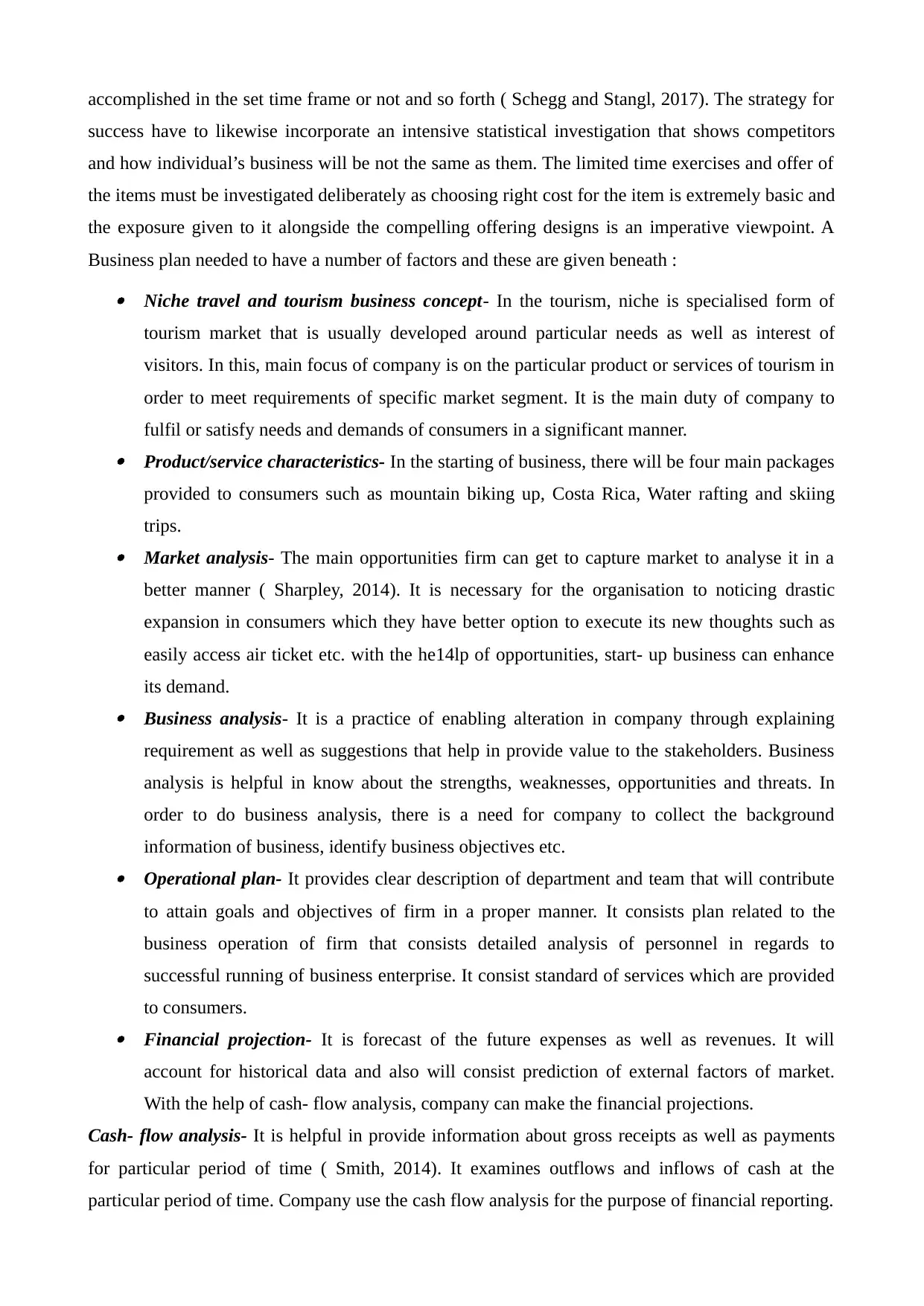
accomplished in the set time frame or not and so forth ( Schegg and Stangl, 2017). The strategy for
success have to likewise incorporate an intensive statistical investigation that shows competitors
and how individual’s business will be not the same as them. The limited time exercises and offer of
the items must be investigated deliberately as choosing right cost for the item is extremely basic and
the exposure given to it alongside the compelling offering designs is an imperative viewpoint. A
Business plan needed to have a number of factors and these are given beneath :
Niche travel and tourism business concept- In the tourism, niche is specialised form of
tourism market that is usually developed around particular needs as well as interest of
visitors. In this, main focus of company is on the particular product or services of tourism in
order to meet requirements of specific market segment. It is the main duty of company to
fulfil or satisfy needs and demands of consumers in a significant manner. Product/service characteristics- In the starting of business, there will be four main packages
provided to consumers such as mountain biking up, Costa Rica, Water rafting and skiing
trips. Market analysis- The main opportunities firm can get to capture market to analyse it in a
better manner ( Sharpley, 2014). It is necessary for the organisation to noticing drastic
expansion in consumers which they have better option to execute its new thoughts such as
easily access air ticket etc. with the he14lp of opportunities, start- up business can enhance
its demand. Business analysis- It is a practice of enabling alteration in company through explaining
requirement as well as suggestions that help in provide value to the stakeholders. Business
analysis is helpful in know about the strengths, weaknesses, opportunities and threats. In
order to do business analysis, there is a need for company to collect the background
information of business, identify business objectives etc. Operational plan- It provides clear description of department and team that will contribute
to attain goals and objectives of firm in a proper manner. It consists plan related to the
business operation of firm that consists detailed analysis of personnel in regards to
successful running of business enterprise. It consist standard of services which are provided
to consumers. Financial projection- It is forecast of the future expenses as well as revenues. It will
account for historical data and also will consist prediction of external factors of market.
With the help of cash- flow analysis, company can make the financial projections.
Cash- flow analysis- It is helpful in provide information about gross receipts as well as payments
for particular period of time ( Smith, 2014). It examines outflows and inflows of cash at the
particular period of time. Company use the cash flow analysis for the purpose of financial reporting.
success have to likewise incorporate an intensive statistical investigation that shows competitors
and how individual’s business will be not the same as them. The limited time exercises and offer of
the items must be investigated deliberately as choosing right cost for the item is extremely basic and
the exposure given to it alongside the compelling offering designs is an imperative viewpoint. A
Business plan needed to have a number of factors and these are given beneath :
Niche travel and tourism business concept- In the tourism, niche is specialised form of
tourism market that is usually developed around particular needs as well as interest of
visitors. In this, main focus of company is on the particular product or services of tourism in
order to meet requirements of specific market segment. It is the main duty of company to
fulfil or satisfy needs and demands of consumers in a significant manner. Product/service characteristics- In the starting of business, there will be four main packages
provided to consumers such as mountain biking up, Costa Rica, Water rafting and skiing
trips. Market analysis- The main opportunities firm can get to capture market to analyse it in a
better manner ( Sharpley, 2014). It is necessary for the organisation to noticing drastic
expansion in consumers which they have better option to execute its new thoughts such as
easily access air ticket etc. with the he14lp of opportunities, start- up business can enhance
its demand. Business analysis- It is a practice of enabling alteration in company through explaining
requirement as well as suggestions that help in provide value to the stakeholders. Business
analysis is helpful in know about the strengths, weaknesses, opportunities and threats. In
order to do business analysis, there is a need for company to collect the background
information of business, identify business objectives etc. Operational plan- It provides clear description of department and team that will contribute
to attain goals and objectives of firm in a proper manner. It consists plan related to the
business operation of firm that consists detailed analysis of personnel in regards to
successful running of business enterprise. It consist standard of services which are provided
to consumers. Financial projection- It is forecast of the future expenses as well as revenues. It will
account for historical data and also will consist prediction of external factors of market.
With the help of cash- flow analysis, company can make the financial projections.
Cash- flow analysis- It is helpful in provide information about gross receipts as well as payments
for particular period of time ( Smith, 2014). It examines outflows and inflows of cash at the
particular period of time. Company use the cash flow analysis for the purpose of financial reporting.
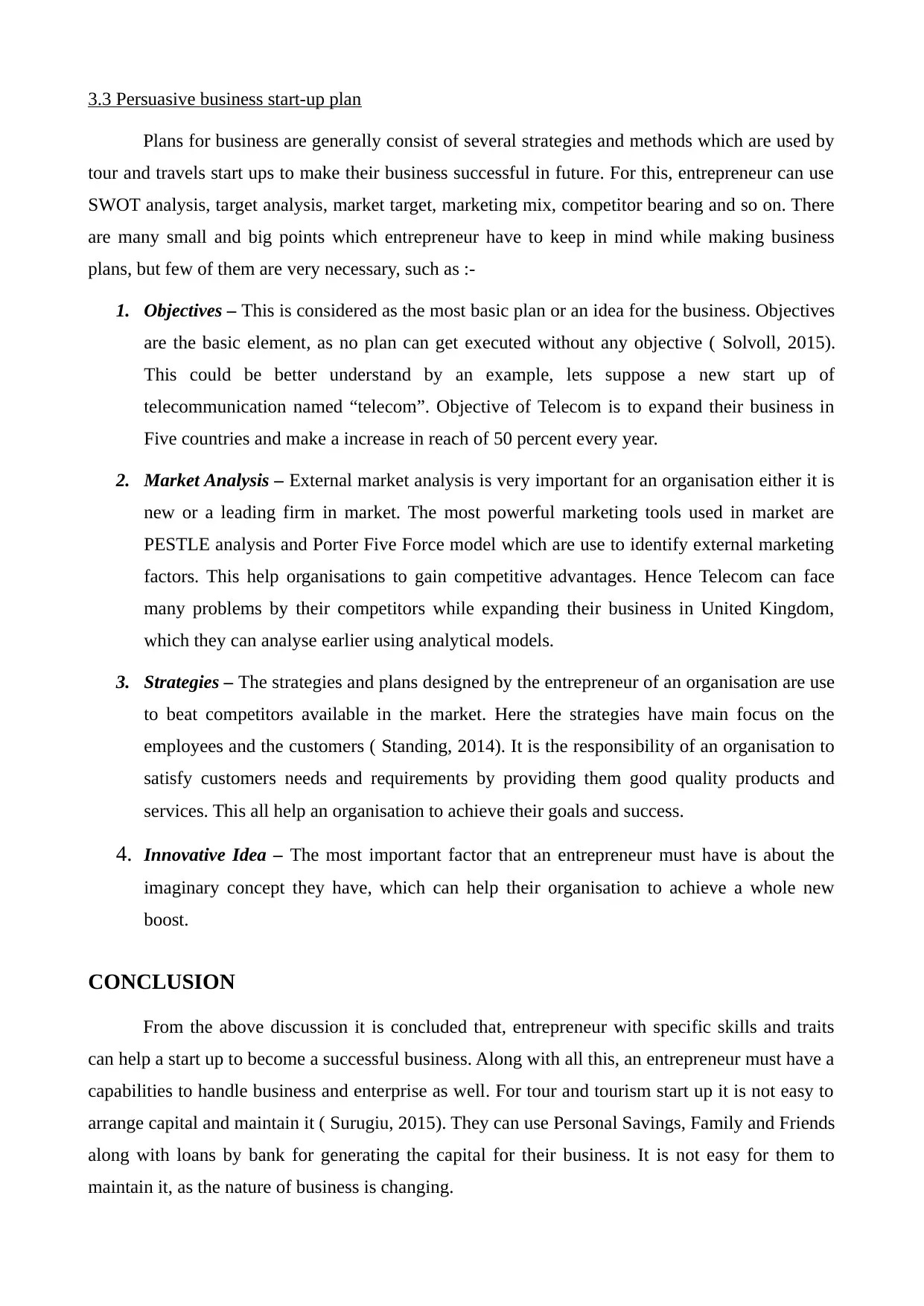
3.3 Persuasive business start-up plan
Plans for business are generally consist of several strategies and methods which are used by
tour and travels start ups to make their business successful in future. For this, entrepreneur can use
SWOT analysis, target analysis, market target, marketing mix, competitor bearing and so on. There
are many small and big points which entrepreneur have to keep in mind while making business
plans, but few of them are very necessary, such as :-
1. Objectives – This is considered as the most basic plan or an idea for the business. Objectives
are the basic element, as no plan can get executed without any objective ( Solvoll, 2015).
This could be better understand by an example, lets suppose a new start up of
telecommunication named “telecom”. Objective of Telecom is to expand their business in
Five countries and make a increase in reach of 50 percent every year.
2. Market Analysis – External market analysis is very important for an organisation either it is
new or a leading firm in market. The most powerful marketing tools used in market are
PESTLE analysis and Porter Five Force model which are use to identify external marketing
factors. This help organisations to gain competitive advantages. Hence Telecom can face
many problems by their competitors while expanding their business in United Kingdom,
which they can analyse earlier using analytical models.
3. Strategies – The strategies and plans designed by the entrepreneur of an organisation are use
to beat competitors available in the market. Here the strategies have main focus on the
employees and the customers ( Standing, 2014). It is the responsibility of an organisation to
satisfy customers needs and requirements by providing them good quality products and
services. This all help an organisation to achieve their goals and success.
4. Innovative Idea – The most important factor that an entrepreneur must have is about the
imaginary concept they have, which can help their organisation to achieve a whole new
boost.
CONCLUSION
From the above discussion it is concluded that, entrepreneur with specific skills and traits
can help a start up to become a successful business. Along with all this, an entrepreneur must have a
capabilities to handle business and enterprise as well. For tour and tourism start up it is not easy to
arrange capital and maintain it ( Surugiu, 2015). They can use Personal Savings, Family and Friends
along with loans by bank for generating the capital for their business. It is not easy for them to
maintain it, as the nature of business is changing.
Plans for business are generally consist of several strategies and methods which are used by
tour and travels start ups to make their business successful in future. For this, entrepreneur can use
SWOT analysis, target analysis, market target, marketing mix, competitor bearing and so on. There
are many small and big points which entrepreneur have to keep in mind while making business
plans, but few of them are very necessary, such as :-
1. Objectives – This is considered as the most basic plan or an idea for the business. Objectives
are the basic element, as no plan can get executed without any objective ( Solvoll, 2015).
This could be better understand by an example, lets suppose a new start up of
telecommunication named “telecom”. Objective of Telecom is to expand their business in
Five countries and make a increase in reach of 50 percent every year.
2. Market Analysis – External market analysis is very important for an organisation either it is
new or a leading firm in market. The most powerful marketing tools used in market are
PESTLE analysis and Porter Five Force model which are use to identify external marketing
factors. This help organisations to gain competitive advantages. Hence Telecom can face
many problems by their competitors while expanding their business in United Kingdom,
which they can analyse earlier using analytical models.
3. Strategies – The strategies and plans designed by the entrepreneur of an organisation are use
to beat competitors available in the market. Here the strategies have main focus on the
employees and the customers ( Standing, 2014). It is the responsibility of an organisation to
satisfy customers needs and requirements by providing them good quality products and
services. This all help an organisation to achieve their goals and success.
4. Innovative Idea – The most important factor that an entrepreneur must have is about the
imaginary concept they have, which can help their organisation to achieve a whole new
boost.
CONCLUSION
From the above discussion it is concluded that, entrepreneur with specific skills and traits
can help a start up to become a successful business. Along with all this, an entrepreneur must have a
capabilities to handle business and enterprise as well. For tour and tourism start up it is not easy to
arrange capital and maintain it ( Surugiu, 2015). They can use Personal Savings, Family and Friends
along with loans by bank for generating the capital for their business. It is not easy for them to
maintain it, as the nature of business is changing.
⊘ This is a preview!⊘
Do you want full access?
Subscribe today to unlock all pages.

Trusted by 1+ million students worldwide
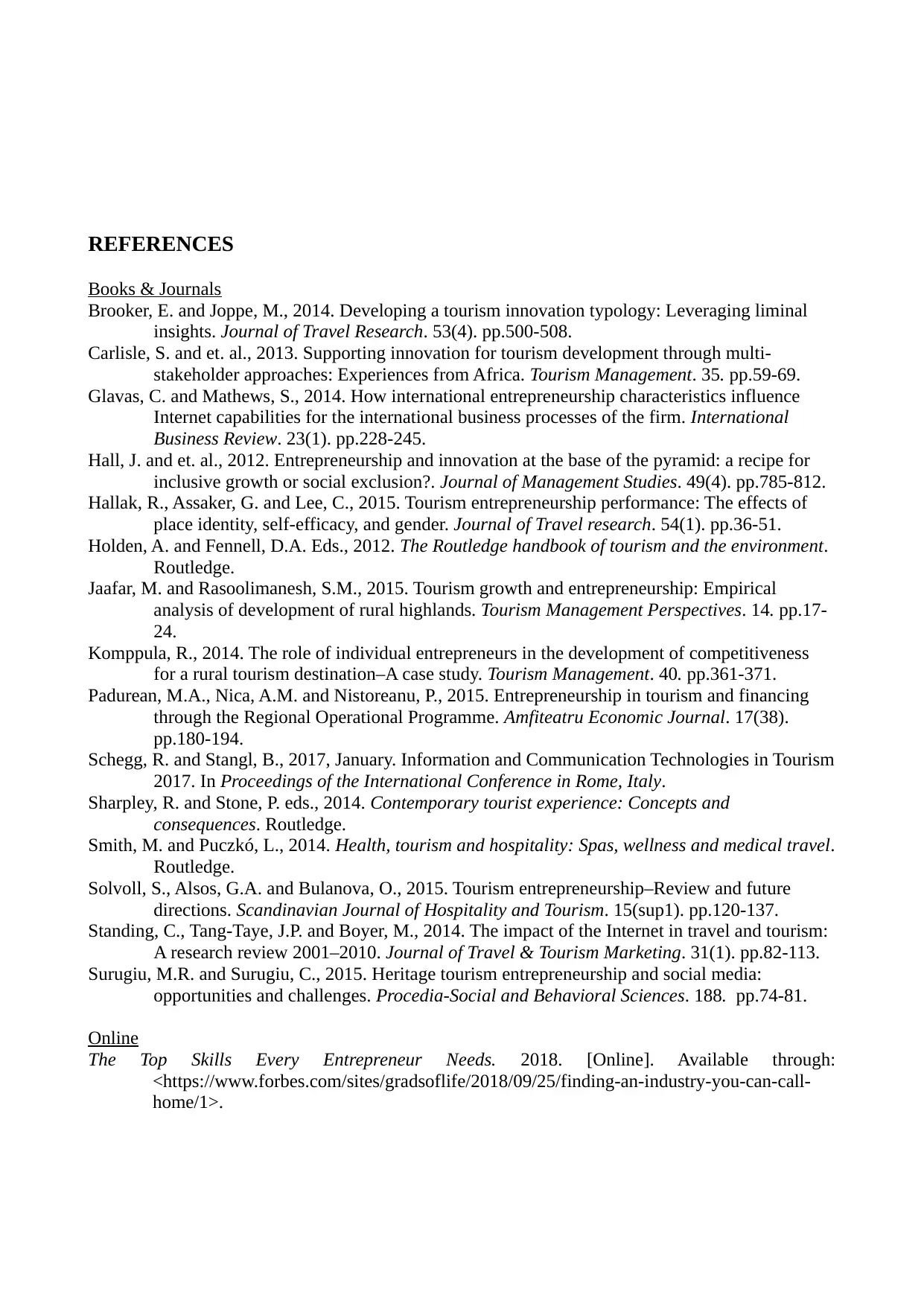
REFERENCES
Books & Journals
Brooker, E. and Joppe, M., 2014. Developing a tourism innovation typology: Leveraging liminal
insights. Journal of Travel Research. 53(4). pp.500-508.
Carlisle, S. and et. al., 2013. Supporting innovation for tourism development through multi-
stakeholder approaches: Experiences from Africa. Tourism Management. 35. pp.59-69.
Glavas, C. and Mathews, S., 2014. How international entrepreneurship characteristics influence
Internet capabilities for the international business processes of the firm. International
Business Review. 23(1). pp.228-245.
Hall, J. and et. al., 2012. Entrepreneurship and innovation at the base of the pyramid: a recipe for
inclusive growth or social exclusion?. Journal of Management Studies. 49(4). pp.785-812.
Hallak, R., Assaker, G. and Lee, C., 2015. Tourism entrepreneurship performance: The effects of
place identity, self-efficacy, and gender. Journal of Travel research. 54(1). pp.36-51.
Holden, A. and Fennell, D.A. Eds., 2012. The Routledge handbook of tourism and the environment.
Routledge.
Jaafar, M. and Rasoolimanesh, S.M., 2015. Tourism growth and entrepreneurship: Empirical
analysis of development of rural highlands. Tourism Management Perspectives. 14. pp.17-
24.
Komppula, R., 2014. The role of individual entrepreneurs in the development of competitiveness
for a rural tourism destination–A case study. Tourism Management. 40. pp.361-371.
Padurean, M.A., Nica, A.M. and Nistoreanu, P., 2015. Entrepreneurship in tourism and financing
through the Regional Operational Programme. Amfiteatru Economic Journal. 17(38).
pp.180-194.
Schegg, R. and Stangl, B., 2017, January. Information and Communication Technologies in Tourism
2017. In Proceedings of the International Conference in Rome, Italy.
Sharpley, R. and Stone, P. eds., 2014. Contemporary tourist experience: Concepts and
consequences. Routledge.
Smith, M. and Puczkó, L., 2014. Health, tourism and hospitality: Spas, wellness and medical travel.
Routledge.
Solvoll, S., Alsos, G.A. and Bulanova, O., 2015. Tourism entrepreneurship–Review and future
directions. Scandinavian Journal of Hospitality and Tourism. 15(sup1). pp.120-137.
Standing, C., Tang-Taye, J.P. and Boyer, M., 2014. The impact of the Internet in travel and tourism:
A research review 2001–2010. Journal of Travel & Tourism Marketing. 31(1). pp.82-113.
Surugiu, M.R. and Surugiu, C., 2015. Heritage tourism entrepreneurship and social media:
opportunities and challenges. Procedia-Social and Behavioral Sciences. 188. pp.74-81.
Online
The Top Skills Every Entrepreneur Needs. 2018. [Online]. Available through:
<https://www.forbes.com/sites/gradsoflife/2018/09/25/finding-an-industry-you-can-call-
home/1>.
Books & Journals
Brooker, E. and Joppe, M., 2014. Developing a tourism innovation typology: Leveraging liminal
insights. Journal of Travel Research. 53(4). pp.500-508.
Carlisle, S. and et. al., 2013. Supporting innovation for tourism development through multi-
stakeholder approaches: Experiences from Africa. Tourism Management. 35. pp.59-69.
Glavas, C. and Mathews, S., 2014. How international entrepreneurship characteristics influence
Internet capabilities for the international business processes of the firm. International
Business Review. 23(1). pp.228-245.
Hall, J. and et. al., 2012. Entrepreneurship and innovation at the base of the pyramid: a recipe for
inclusive growth or social exclusion?. Journal of Management Studies. 49(4). pp.785-812.
Hallak, R., Assaker, G. and Lee, C., 2015. Tourism entrepreneurship performance: The effects of
place identity, self-efficacy, and gender. Journal of Travel research. 54(1). pp.36-51.
Holden, A. and Fennell, D.A. Eds., 2012. The Routledge handbook of tourism and the environment.
Routledge.
Jaafar, M. and Rasoolimanesh, S.M., 2015. Tourism growth and entrepreneurship: Empirical
analysis of development of rural highlands. Tourism Management Perspectives. 14. pp.17-
24.
Komppula, R., 2014. The role of individual entrepreneurs in the development of competitiveness
for a rural tourism destination–A case study. Tourism Management. 40. pp.361-371.
Padurean, M.A., Nica, A.M. and Nistoreanu, P., 2015. Entrepreneurship in tourism and financing
through the Regional Operational Programme. Amfiteatru Economic Journal. 17(38).
pp.180-194.
Schegg, R. and Stangl, B., 2017, January. Information and Communication Technologies in Tourism
2017. In Proceedings of the International Conference in Rome, Italy.
Sharpley, R. and Stone, P. eds., 2014. Contemporary tourist experience: Concepts and
consequences. Routledge.
Smith, M. and Puczkó, L., 2014. Health, tourism and hospitality: Spas, wellness and medical travel.
Routledge.
Solvoll, S., Alsos, G.A. and Bulanova, O., 2015. Tourism entrepreneurship–Review and future
directions. Scandinavian Journal of Hospitality and Tourism. 15(sup1). pp.120-137.
Standing, C., Tang-Taye, J.P. and Boyer, M., 2014. The impact of the Internet in travel and tourism:
A research review 2001–2010. Journal of Travel & Tourism Marketing. 31(1). pp.82-113.
Surugiu, M.R. and Surugiu, C., 2015. Heritage tourism entrepreneurship and social media:
opportunities and challenges. Procedia-Social and Behavioral Sciences. 188. pp.74-81.
Online
The Top Skills Every Entrepreneur Needs. 2018. [Online]. Available through:
<https://www.forbes.com/sites/gradsoflife/2018/09/25/finding-an-industry-you-can-call-
home/1>.
1 out of 10
Related Documents
Your All-in-One AI-Powered Toolkit for Academic Success.
+13062052269
info@desklib.com
Available 24*7 on WhatsApp / Email
![[object Object]](/_next/static/media/star-bottom.7253800d.svg)
Unlock your academic potential
Copyright © 2020–2025 A2Z Services. All Rights Reserved. Developed and managed by ZUCOL.





